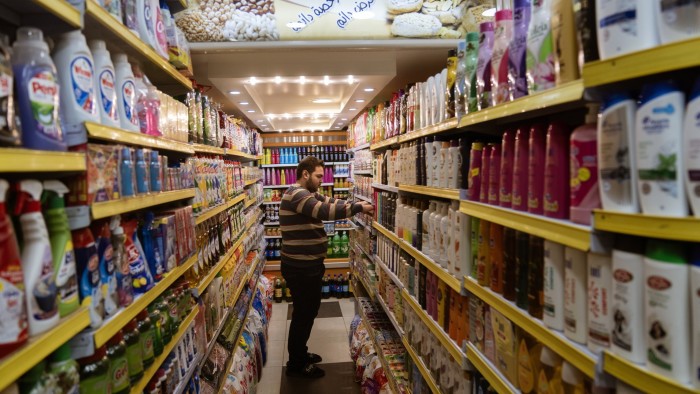Unlock the Editor’s Digest for free
Roula Khalaf, Editor of the FT, selects her favourite stories in this weekly newsletter.
Syria has been flooded with imports in the aftermath of Bashar al-Assad’s ousting, with the end of dollar restrictions and exorbitant tariffs leading to a boom in goods that disappeared from shelves during the civil war.
In the weeks since Assad was deposed in an offensive led by Islamist militant group Hayat Tahrir al-Sham, imported western and regional goods have poured into shops.
Around the capital Damascus, stores are now lined with Turkish bottled water, Saudi-produced bouillon cubes, Lebanese powdered milk and western chocolate brands such as Twix and Snickers. In one supermarket in the centre of the city, an entire wall was dedicated to Pringles.
“Everything imported you see is new,” one worker in a supermarket said, adding that people were most excited about cheese cubes and drinks such as Pepsi. “Everything we used to sell used to be Syrian produced.”
Assad, in 2013, criminalised foreign currencies in an effort to strengthen the Syrian pound during the brutal 13-year conflict, while the regime also hiked custom duties to shore up revenues. iPhones, for example, were subject to a duty of nearly $900 as of last year.
This forced Syrians to rely on locally produced goods, with rampant smuggling from Lebanon of items that could not be domestically sourced, such as soy sauce. International sanctions exacerbated the isolation, though food and medicine were exempt.
Foreign items used to be hidden behind counters and sold in secret to those who knew to ask. Fear of raids, arrests and extortion by security personnel were so high that Syrians often avoided mentioning the word “dollar” altogether — using code words such as “parsley” instead.
The new HTS-led government has since permitted transactions in dollars, and on Saturday announced a new set of unified custom fees that it said reduced fees by 50 to 60 per cent. It added that lower fees on raw material imports would help protect local producers.
“Our main task in this period is to pump blood into the arteries of the economy, preserve institutions and serve citizens,” Maher Khalil al-Hasan, the minister of internal trade, told state news agency Sana this month.
Imported goods that for years flowed from Turkey into the HTS-led northwestern Idlib province have begun passing into the rest of the country, as well as those from Lebanon, where cars drive through the border mostly unchecked.
Local brands remain significantly cheaper than foreign ones. A bottle of Syrian ketchup Dolly’s, for example, sold for 14,000 Syrian pounds (about $1) in a supermarket, whereas Heinz sold for 78,000.
But other staples have become affordable again. Lebanese bananas, which went from being an everyday item to a luxury during the civil war, have arrived from the lush coast, reducing the price of a kilo down by about a fifth, vendors said.
Mahmoud, a 35-year-old vegetable and fruit seller, said all his produce had dropped in price in the past month, imported or otherwise. Foreign pineapples now cost a fifth their previous price, and local potatoes a fourth.
He attributed this to the end of widespread extortion under Assad, in which farmers en route to wholesalers would have to hand over chunks of their produce at military checkpoints, many run by the infamously brutal Fourth Division of Bashar’s brother Maher. This forced them to charge higher prices to make up for losses.
“What can a farmer say to them? He needs to make a living,” Mahmoud said, adding that he used to have to hand over bags of produce to officers and soldiers when they raided him.
His stand in the central Shaalan market was empty on Saturday morning, however, as Syrians tighten their purse strings due to delayed salary payments.
“But I feel secure,” he said. “You’re no longer walking around with your eyes darting everywhere, worried they’re coming after you.”
The return of another nostalgic brand, France’s The Laughing Cow processed cheese cubes used for sandwiches by generations of Syrian children, has prompted wry online jokes.
“How long has it been since you saw this smile?” said one Syrian in a video on Instagram of the brand’s famous bovine mascot. “The ass has left and the cow has returned.”
Read the full article here




